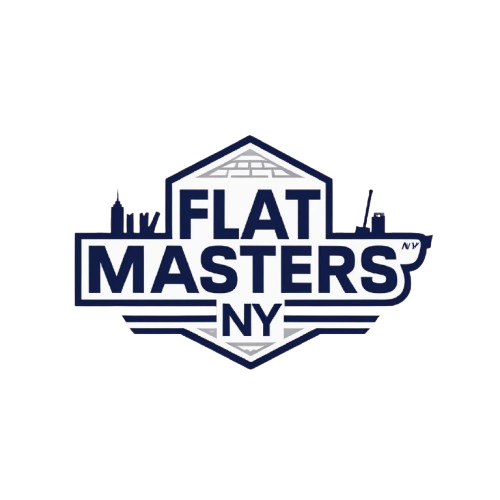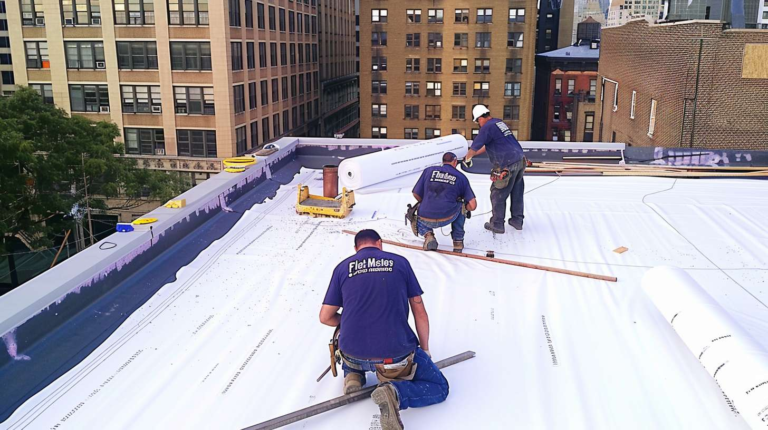Professional Flat Roof Truss Systems Installation & Repair
Look, I've been installing and repairing flat roof truss systems across Queens for over two decades, and I still get homeowners asking me "do flat roofs have trusses?" The answer is yes - but not always in the way you might think.
Most flat roofs in Queens actually use engineered truss systems, especially when we're dealing with spans over 20 feet. Whether you're looking at a commercial building in Long Island City or a residential addition in Astoria, flat roof truss systems provide the structural backbone that keeps everything solid above your head.
Understanding Flat Roof Truss Applications and Types
Here's the thing about truss applications and types for flat roofs - they're not actually "flat" at all. Every properly designed system includes a slight slope for drainage, typically 1/4 inch per foot minimum. I can't tell you how many times I've had to fix problems on truly flat roofs where water just sits there like a swimming pool.
The main types we install in Queens include:
- Parallel chord trusses - most common for commercial applications
- Scissor trusses with minimal slope - great for residential flat roof additions
- Modified king post trusses - perfect for smaller spans under 24 feet
- Bowstring trusses - used on larger commercial buildings, though less common
Just last month on 31st Street in Astoria, we replaced an entire truss system on a 1950s ranch house where the original builder had used undersized lumber. The homeowner thought they just needed new roofing membrane, but when my foreman Carlos got up there, we found three trusses with significant deflection.
Sloped Flat Roof Trusses: The Science Behind the Slight Angle
Sloped flat roof trusses are engineered to create that critical drainage slope while maintaining the flat roof appearance. The slope is built right into the truss design - we're not just shimming boards up there and hoping for the best.
When we design sloping flat roof truss systems, we consider the span, load requirements, and local snow loads. Here in Queens, we deal with some serious snow loads - I've seen 3 feet of snow sit on roofs for weeks during bad winters. Your sloping flat roof truss span determines everything from lumber size to connection details.
For spans up to 24 feet, we typically use 2x8 or 2x10 lumber with engineered connectors. Anything over 24 feet, and we're looking at engineered lumber or steel components. The sloping flat roof truss details get pretty specific - we're talking about precise angles, load calculations, and connection specifications that need to meet both local building codes and manufacturer requirements.
Wood Flat Roof Truss Construction
Most residential applications use wood flat roof truss systems because they're cost-effective and work well for typical home additions and garages. We source our lumber from Beacon on Northern Boulevard - they understand Queens contractors and keep quality dimensional lumber in stock.
The beauty of types of flat roof trusses in wood construction is the versatility. We can customize the design for your specific needs, whether you're adding a flat roof over a deck, building a garage addition, or replacing an existing system.
A properly designed roof flat truss system distributes the load evenly across your supporting walls. I always tell homeowners - don't let anyone just throw some joists up there and call it good. Wood trusses flat roof installations require engineered drawings, proper spacing calculations, and professional installation.
Installation Process and Considerations
When we install flat wood roof trusses, the process typically takes 2-3 days for a standard residential project. Day one is usually demo and prep work, day two we set the trusses, and day three we install sheathing and start the membrane work.
The critical factors for roof trusses for flat roof installations include:
- Proper bearing points on existing structure
- Correct spacing - typically 16" or 24" on center
- Adequate ventilation design
- Proper flashing details at walls and penetrations
- Integration with existing drainage systems
Oh, and another thing about drainage - we always install tapered insulation systems on top of the structural deck. This creates additional slope and ensures water moves toward drains and scuppers, not into your living space.
Adding Trusses to Existing Flat Roofs
Adding trusses to a flat roof is more complex than new construction, but it's often necessary when dealing with older Queens buildings. Last Tuesday, we worked on a 1960s house in Elmhurst where the original flat roof was built with undersized joists spaced too far apart. The homeowner was getting membrane failures every few years because the deck was moving too much.
The process involves careful structural analysis, temporary support during construction, and integration with existing building systems. We typically need to coordinate with a structural engineer, especially when we're dealing with load-bearing modifications or buildings over 40 years old.
Sometimes we can sister new trusses alongside existing joists. Other times, complete replacement is the only viable option. It depends on the existing structure's condition and the loads we need to carry.
Cost Considerations for Flat Roof Truss Systems
Residential flat roof truss installation typically runs $8-15 per square foot for the structural system alone, not including decking, membrane, or insulation. Commercial applications can range from $12-25 per square foot depending on span requirements and load specifications.
The variables that affect cost include span length, load requirements, lumber prices (which fluctuate constantly), and access challenges. A simple garage addition might cost $3,000-5,000 for the complete truss system, while a large residential flat roof replacement can run $15,000-30,000.
I always recommend getting the structural engineering done properly upfront. Yes, it costs $800-1,500 for the drawings, but it's cheap insurance compared to having to redo work because it doesn't meet code requirements.
Why Professional Installation Matters
Look, I've seen too many DIY flat roof truss disasters over the years. These aren't deck joists - they're engineered structural components that need to be installed correctly. The connection details, spacing requirements, and load transfer mechanisms are critical for long-term performance.
At Flat Masters NY, we handle the entire process from structural design through final membrane installation. Our team has installed over 2,000 flat roof systems across Queens, and we understand the unique challenges of working in our neighborhoods - from narrow lot access in Jackson Heights to historic district requirements in Forest Hills.
Every flat roof truss installation includes a structural warranty, and we work with certified engineers to ensure all designs meet current building codes. Whether you need new construction or are retrofitting an existing building, we have the experience and equipment to handle projects of any size.
When you're ready to discuss your flat roof truss system project, give us a call. We'll evaluate your specific situation, provide detailed cost estimates, and explain exactly what's involved in creating a structurally sound, long-lasting flat roof system for your Queens property.


